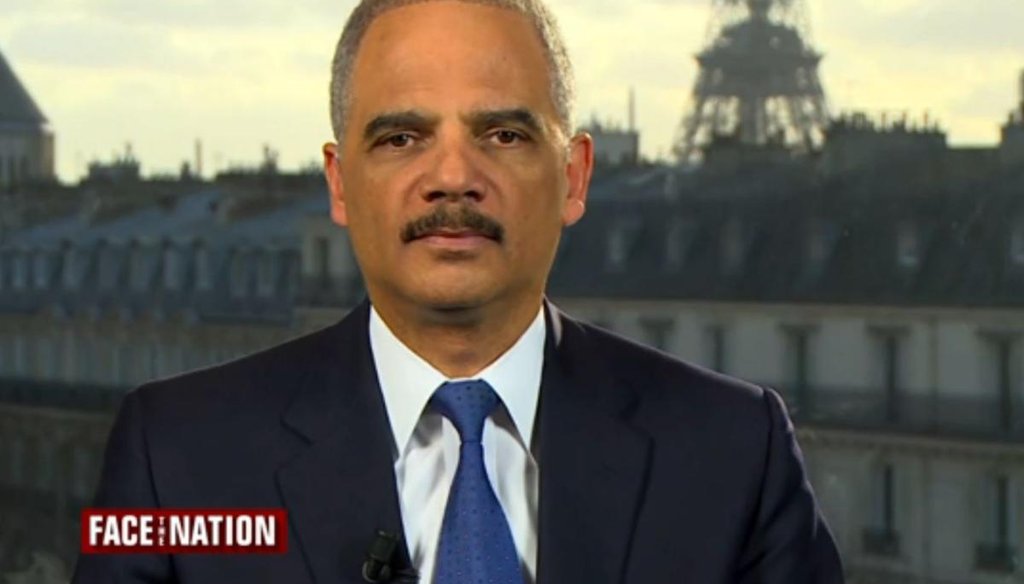Stand up for the facts!
Our only agenda is to publish the truth so you can be an informed participant in democracy.
We need your help.
I would like to contribute

Attorney General Eric Holder gave cautious answers as TV hosts asked him about the attacks in Paris and an investigation into former CIA director David Petraeus. Screenshot.
As world leaders linked arms and led millions of Parisians in a march honoring the 17 people killed by terrorists last week, security officials from around the world continued to work on identifying the affiliation of the extremists behind the attacks.
Help PolitiFact fund live fact-checking of the 2015 State of the Union and GOP response.
U.S. Attorney General Eric Holder, appearing on several Sunday news shows from France, said information about potential terrorists is already being exchanged among countries, but the system must be improved as leaders try to prevent similar small-scale attacks from unfolding within the United States.
"One nation cannot by itself hope to forestall the possibility of terrorism, even within its own borders," said Holder, who did not join the march, on ABC This Week.
U.S. Rep. Michael McCaul, a Texas Republican and House Homeland Security Committee chairman, said it is difficult for U.S. intelligence officers to prevent European foreign fighters who have trained in Syria, Iraq and Yemen from entering the United States due in part to lax regulations over European travel.
Sign up for PolitiFact texts
"Western Europe, again, is more lenient in their travel restrictions," McCaul said on CBS’ Face the Nation. "And we have a visa waiver-free system where they can fly in the United States without even having a visa. We need to look at all sorts of things like that."
A quick peek at the State Department website shows that McCaul has it right, so we rate his statement True.
Tourists from 28 European nations do not need a visa for visits that last no longer than three months. However, they do need to complete an online application, and in some cases, U.S. officials will deny them entry.
A report from the Henry Jackson Society, a London-based group that favors a strong military to support liberal democracies, found that there has been only one case of al-Qaida-connected incidents in the United States -- the so-called "underwear bomber" in 2009 -- since 2003. The group concluded that the European and American counterterrorism strategy had been effective in reducing the threat of an al-Qaida-related attack in the United States, although the Boston Marathon bombing showed that the risk was ongoing.
Still, the number of Europeans who have gone to the Middle East in pursuit of jihad has climbed sharply, said Brian Jenkins, a RAND Corporation advisor and a former member of the White House Commission on Aviation Safety and Security. It’s a potential vulnerability, though he says the greater risk for Americans comes from people who already live here.
Other experts said the U.S. strategy is effective.
"At best, it does prevent known terrorists from entering the country," said William Braniff, executive director of the National Consortium for the Study of Terrorism and Responses to Terrorism at the University of Maryland. "At worst, it may serve as a deterrent. Attacking in Europe may be perceived as less risky but of similar reward than risking the flight to the United States."
Back in Washington, the Keystone XL pipeline remains a sticking point between the new Republican Congress and President Barack Obama, who said he will veto GOP legislation to authorize the years-delayed project. On Fox News Sunday, Sen. John Hoeven, R-N.D., acknowledged the Senate is four votes short of the 67 votes required to override an Obama veto.
Host Chris Wallace asked Hoeven and Keystone XL opponent, Sen. Chris Coons, D-Del., to boil down what the project really means for the environment and energy supply.
"Keystone means unlocking the Canadian tar sands, some of the dirtiest sources of energy on the planet," Coons said.
His claim about the project "unlocking" oil sands production rates Mostly False.
In reality, oil production from the tar sands of Canada’s boreal forests has been steadily growing without the Keystone XL pipeline, which would usher more than 800,000 barrels of crude oil from Alberta to Steele City, Neb., and eventually to Gulf Coast refineries via another pipeline that opened about a year ago.
Most experts expect this trend to continue, even as oil prices remain low at around $50 per barrel.
At most, Keystone XL would allow an increase in oil sands production of about 25 percent from today's levels, said Andrew Leach, a professor of energy policy at the University of Alberta School of Business. He said that tar sands will come out as long as there is someone willing to pay for the oil, and "that demand doesn’t go away if there’s no pipeline from Canada."
That said, the pipeline offers much lower transportation costs than current transportation methods, and that would would encourage greater oil production.
"He might have been better served saying ‘further unlocked’ than simply ‘unlocked,’ " said Coons spokesman Ian Koski.
Katie Sanders contributed to this report. Read the full fact-checks at PolitiFact.com.
Our Sources
See fact-checks.












































